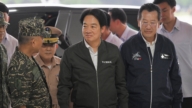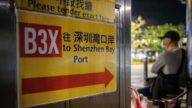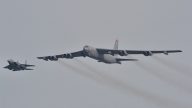【新唐人2013年11月30日訊】中共突然單方面宣稱設立「東海防空識別區」,連日來引發東海局勢緊張。美、日、韓不理會中共的規定,三國軍機「平安無事」的接連飛越那一地區,中共被迫提出所謂「嚴正交涉」。儘管中共事前的嚴厲警告和事後低調、顧左右而言他的聲明,在民間輿論中飽受嘲諷,但也有評論認為,中共的做法已經惹怒了美、日等國。到底這個地區會否爆發戰爭?一起來聽聽專家分析。
中共上週末宣佈實施「東海防空識別區」時,軍方放出豪言,聲稱對不服從防空識別區管制的外國飛行器可以擊落。但先後進入中共劃設的「防空識別區」的美、日、韓三國戰機,都沒有遇到攔截的風險。
在眾目睽睽和一片奚落聲下,中共先是長時間保持沉默,假裝沒事,然後低調做出反應。軍方和外交部聲稱,對美國轟炸機進行了「全程監視、及時識別」,判明瞭美方飛機類別,但不再用「緊急處置措施」或「擊落」之類的狠話。28號,中共軍方表示,已經派遣一系列主戰飛機前往中國東海「防空識別區」進行所謂「常態化空中巡邏」。
與此同時,英國《路透社》報導,在「東海防空識別區」爭議升級的同時,中共第一艘航空母艦「遼寧艦」26號也啟航南海,然而取道台灣海峽,不繞經巴士海峽,避開了有爭議的東海水域。
29號,台灣《中央社》引述美國有線電視新聞網《CNN》的報導說,美國航空母艦「喬治華盛頓號」開抵日本沖繩南方的太平洋,與日本展開大規模聯合軍演。由於此處正好接近中共新宣佈劃設的「東海防空識別區」,因此這次演習特別耐人尋味。外界不少聲音發問:東海地區到底會不會爆發戰爭?
中國問題專家石實:「這次它(中共)等於惹了眾怒了。這個局勢下我認為是不會爆發戰爭的。為甚麼呢?你去看國防部的反應。國防部在美國軍機進入之後,它(中共)的反應非常的弱。說明它不想把這個事情弄大,或者說它們內部還沒有下結論。所以在這種情況下,無論南韓飛機進去還是日本飛機進去,暫時不會有事。」
旅美政論家伍凡也認為,戰爭很不容易打起來,主要有兩大原因。
旅美政論家伍凡:「 第一,雙方都沒有準備好。日本老百姓也不想打仗。中國老百姓想打仗嗎?也不想打仗,中國老百姓想打仗的真正目地是把中共搞垮。 再一個,美國更不願意打仗。美國國庫欠了17億兆的錢,哪有力量打仗呢?但是美國又不得不出面,它支持日本的目地就是要制止戰爭,不讓那個戰爭打起來。所以中國(中共)有一批人想玩把戲。」
美國《大紀元新聞網》報導,防空識別區事件曝光了三中全會後,中共高層全亂套了。
中國維權律師滕彪在此之前接受《德國之聲》採訪時表示,中共政權需要敵人,因此即便沒有反抗,中共也要製造出敵人來。
中國問題專家石實分析,看中、日會否發生戰爭,一個最主要的風向標,要看日本的商用飛機在經過防空區的時候,當它不事先向中共通報的時候,會不會被迫降。
石實:「這是很重要的一個信號。可以看出中共的決心有多大。中、日之間商業飛機如果能互通,而沒有軍機去迫降它的話,那就說明這個防空區純粹是一個試探。」
在27號的中共外交部例會上,有記者問道,對於美、日做法,中方是否擔心「東海防空識別區」將被認為是「紙老虎」?中共外交部發言人秦剛回答:「紙老虎」這個詞是有特別含意的。可以查查當年毛澤東說「紙老虎」指的是甚麼。
秦剛還在28號北京的例行記者會上表示,中方已分別向日方和美方提出所謂的「嚴正交涉」,但也引來外界大量的嘲諷,認為中共只會對內「維穩」,對外則「光說不練」。
《美國之音》的報導援引了世界各地報章的看法後,譏笑中共這只活靈活現的「紙老虎」就這樣出爐了。而且可謂一夜之間火遍全球。
採訪/陳漢 編輯/王子琦 後製/李勇
Will Abrupt Tensions in the East China Sea Lead to War?
The Chinese Communist Party (CCP) suddenly and unilaterally
declared a Air Defense Identification Zone (ADIZ) in the East
China Sea, which has added to recent tensions in the area.
The U.S., Japan and South Korea
disregard the CCP’s new zone.
Military aircraft from these three countries “safely” flew
the area from time to time, which forced the CCP to lodge
so called “solemn representations”.
Despite the prior strict warning, followed by a low tone
and pointless statement, the CCP has been widely mocked
by Chinese netizens.
Some critics agree that the CCP’s actions in this area
have irritated Japan, the U.S. and other countries.
Will the area see violent conflict in the end?
Let’s hear the experts’ analysis.
Last weekend, when the CCP declared an ADIZ
in the East China Sea, the military said in a high tone
that it would shoot down any foreign aircraft that fail to follow
the ADIZ regulation for the area.
However, South Korean, Japanese and U.S. military planes
consecutively entered into the CCP designated ADIZ
without any risk of interception.
Under the ridicule and watchful eyes and of the public ,
the CCP kept silent a long time, pretending nothing happened,
and then made a low-key response.
The military and the Foreign Affair Ministry clarified,
they ‘made a full journey monitoring and timely identification
on the U.S. bombardment aircraft, and knew the aircraft type,’
but without the ruthless words such as “shoot down”
or “emergency defense measures”.
On November 28, the CCP military said a series of their major
aircraft types have been dispatched to the ADIZ
for so-called “normalized air patrolling”.
Meanwhile, Reuters reported that during the escalating ADIZ
dispute, the first CCP’s aircraft carrier “Liaoning” voyaged
to the South China Sea via the Taiwan Strait without detouring
on the Bass Strait, which avoided the disputed East China Sea.
On November 29, Taiwan’s Central News Agency cited CNN
reports that American aircraft carrier George Washington
arrived in the Pacific region just to the south of Okinawa to
join in a large-scale joint war exercise with Japan.
Because this region is very close to the ADIZ,
the war exercise is particularly highlighted.
Many are wondering if war will erupt in the East China Sea.
Shi Shi, China expert: “This time the CCP outraged the public.
Under such a circumstance, I think war won’t break out.
Why? Just look at the CCP Defense Ministry’s response.
The Ministry gave a very weak reaction after U.S. military
aircraft entered the ADIZ, showing that they don’t want to
escalate the event, or there is no conclusion in its inside.
So under this circumstance, even if South Korean or Japanese
aircraft entered the ADIZ, there won’t be a problem.”
Chinese political commentator Wu Fang living in U.S.
says war would be difficult to break out for two key reasons.
Wu Fang: “First, both of the parties are not well prepared.
Japanese people don’t want to fight a war.
Do you think Chinese people want to fight one?
They don’t either.
Chinese peoples’ real goal of supporting war is the CCP’s collapse.
Secondly, Americans prefer even more not to fight a war.
The total debt of American Government has reached 17
trillion dollars, and they have no power to fight.
But America must stand up, and its purpose of supporting
Japan is to stop war.
The CCP has a number of people who want to play a game.”
The Chinese version of US-based Epoch Times News Website
reports that the ADIZ event exposes the turmoil status
among high ranks of the CCP following the third plenum.
Previously, Chinese rights defense lawyer Teng Biao said that
the CCP regime needs an enemy.
Thus even if there is no resistance,
the CCP will have to produce enemy.
Chinese expert Shi Shi says a key sign of a Sino-Japan war
is to see if the commercial Japanese flights are forced to land
when passing through the ADIZ without prior notice.
Shi Shi: “This is a very important signal. From it,
the determination of the CCP will be revealed.
If commercial flights can be made between China and Japan
without forced landing by military aircraft,
then this explains that the ADIZ is purely a trial.”
During the routine media news conference held on the 27th by
the CCP’s Foreign Affairs Ministry, one journalist asked if
China worries that the ADIZ is just a “paper tiger”
in light of the current actions of the U.S. and Japan.
Ministry spokesman Qin Gang replied that “paper tiger”
had a special meaning, and suggested looking up what
the “Paper Tiger” mentioned by Mao Zedong referred to.
Qin Gang said at another press conference on the 28th that
China lodged a “Solemn Representation” to Japan and the U.S.
But it incurred a lot of ridicule, leaving the impression that the
CCP is only good at “Maintaining Stability” in China
and being “all talk and no action” outside China.
Voice of America cited reports mocking the CCP as a living
image of the “Paper Tiger”.
And with that the term became popular worldwide overnight.























